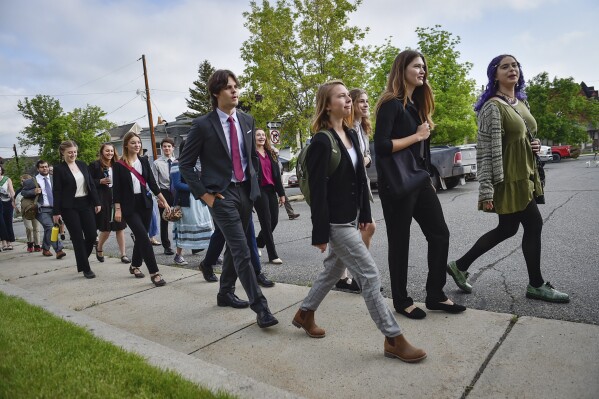Opponents want judge to declare Montana drag reading ban unconstitutional without requiring a trial
HELENA, Mont. (AP) — A group of people, organizations and businesses opposed to a law that restricts drag performances and bans drag reading events at public schools and libraries asked a federal judge to declare Montana’s law unconstitutional without requiring a trial.
“Motivated by an irrational and unevidenced moral panic, legislators took aim at drag performers and the LGBTQ+ community,” Upper Seven Law argued in its motion for a summary judgment filed late Tuesday. Such motions argue there is no dispute about the key facts of a case.
U.S. District Court Judge Brian Morris granted a preliminary injunction blocking enforcement of the law last month, saying it targets free speech and expression and that the text of the law and its legislative history “evince anti-LGBTQ+ animus.”
“No evidence before the Court indicates that minors face any harm from drag-related events or other speech and expression critical of gender norms,” Morris wrote in the injunction.
 Young activists who won Montana climate case want to stop power plant on Yellowstone River
Young activists who won Montana climate case want to stop power plant on Yellowstone River
 US moves to protect wolverines as climate change melts their mountain refuges, threatens extinction
US moves to protect wolverines as climate change melts their mountain refuges, threatens extinction
 Cryer scores 24, No. 6 Houston beats Montana 79-44
Cryer scores 24, No. 6 Houston beats Montana 79-44
The law was passed by the Republican-controlled 2023 Montana Legislature and signed by Republican Gov. Greg Gianforte as several states passed laws targeting drag performances. Montana was the only state to ban people dressed in drag from reading books to children at public schools and libraries, even if the performance does not include sexual content.
The plaintiffs argue that the law is an unconstitutional content- and viewpoint-based restriction on speech. They also argue it does not clearly define what actions are illegal, leading people to censor their own speech out of concern for violating the law.
The state of Montana argued last week that the plaintiffs don’t have any legal claims to make because “the State Defendants have taken no action to enforce or implement,” the law and the plaintiffs haven’t suffered any harm.
The law went into effect when it was signed on May 22.
On June 1, the Butte-Silver Bow Public Library canceled a talk about the history of LGBTQ+ Montanans because the speaker is transgender. Butte-Silver Bow County officials said they weren’t sure if holding the speech in the library would violate the law. Plaintiffs have modified or canceled events, as well, in order not to violate the law, court records state.
The law was first blocked by a temporary restraining order on July 28, in time for Montana Pride to hold its 30th anniversary celebration in Helena. The city had said it wasn’t sure it was able to issue a permit for the event because of the new law.
The state argues the law is meant to protect children from “indecent and inappropriate conduct” that is harmful to them. Montana law already protects minors from exposure to obscenities.
Disclaimer: The copyright of this article belongs to the original author. Reposting this article is solely for the purpose of information dissemination and does not constitute any investment advice. If there is any infringement, please contact us immediately. We will make corrections or deletions as necessary. Thank you.







